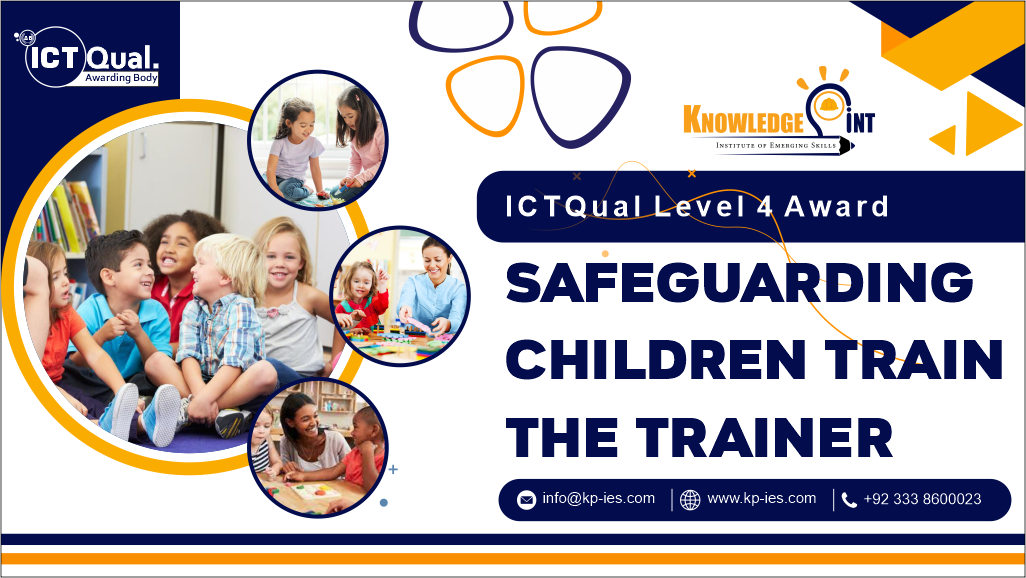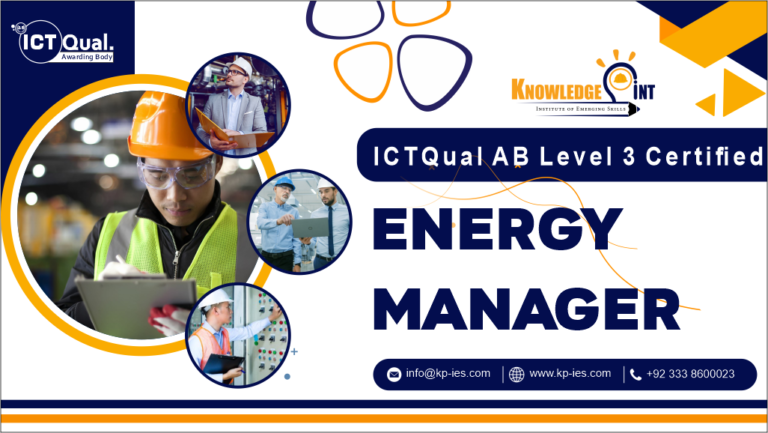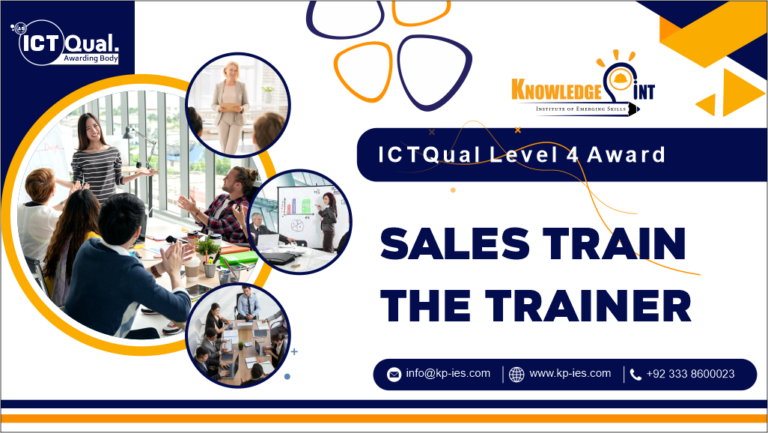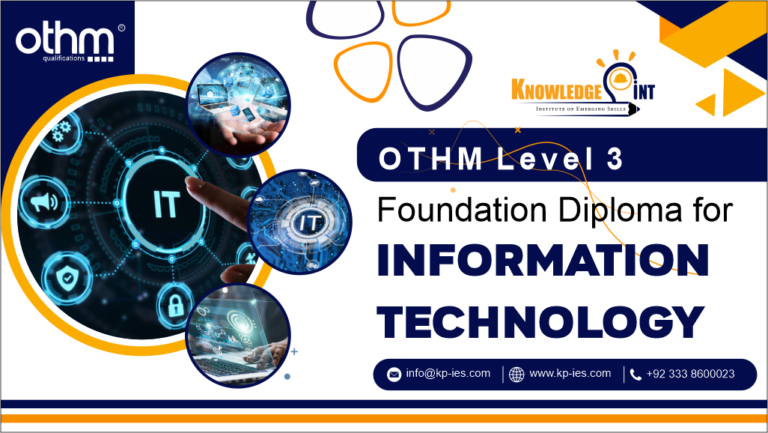In today’s world, safeguarding children is paramount. Ensuring that those responsible for training others on this critical issue are well-equipped is essential. The ICTQual Level 4 Award in Safeguarding Children Train the Trainer is a specialized program designed to empower trainers with the skills and knowledge needed to deliver high-quality safeguarding training. This course is a significant step for professionals who are passionate about protecting children and want to make a tangible difference.
The ICTQual Level 4 Award in Safeguarding Children Train the Trainer is a comprehensive program tailored for individuals who aspire to train others on the essential aspects of child safeguarding. This course equips participants with advanced training techniques, a deep understanding of safeguarding principles, and the ability to create impactful training sessions.
The ICTQual Level 4 Award in Safeguarding Children Train the Trainer is a pivotal program for those dedicated to protecting children and enhancing their training capabilities. This course provides the skills, knowledge, and recognition needed to make a significant impact in the field of child safeguarding. By becoming an expert trainer, you will play a crucial role in educating others and ensuring that safeguarding standards are upheld across organizations. Embrace this opportunity to advance your career and contribute to the safety and well-being of children everywhere.
Course Overview
The ICTQual Level 4 Award in Safeguarding Children Train the Trainer consists of 9 mandatory units which are as follows.
The learning outcomes of ICTQual Level 4 Award in Safeguarding Children Train the Trainer include:
Introduction to Safeguarding Children
- Understanding Safeguarding: Gain a comprehensive understanding of the principles and importance of safeguarding children.
- Roles and Responsibilities: Learn about the roles and responsibilities of individuals and organizations in protecting children.
- Signs and Indicators: Identify signs and indicators of abuse and neglect in children.
Safeguarding Procedures and Risk Assessment
- Procedural Knowledge: Understand the procedures for reporting and responding to concerns about child safety.
- Risk Assessment: Develop skills to conduct thorough risk assessments to identify and mitigate potential threats to child safety.
- Documentation: Learn how to accurately document safeguarding concerns and actions taken.
Communication and Interviewing Skills
- Effective Communication: Master effective communication techniques for discussing sensitive issues related to child safeguarding.
- Interview Techniques: Gain skills in interviewing children and adults in a manner that is sensitive, supportive, and effective.
- Building Trust: Learn how to build trust and rapport with children and their families during safeguarding inquiries.
Child Development and Impact of Abuse
- Stages of Development: Understand the stages of child development and how they can be affected by abuse and neglect.
- Behavioral Indicators: Recognize behavioral indicators of abuse and how they may manifest at different developmental stages.
- Supporting Affected Children: Learn strategies to support children who have experienced abuse or neglect.
Legal and Ethical Considerations in Safeguarding
- Legal Framework: Understand the legal framework surrounding child protection and safeguarding.
- Ethical Issues: Explore the ethical considerations and dilemmas that may arise in safeguarding practice.
- Confidentiality and Consent: Learn about the principles of confidentiality and obtaining consent in safeguarding scenarios.
Designing and Delivering Safeguarding Training
- Training Needs Analysis: Conduct a training needs analysis to determine the specific safeguarding training requirements of your audience.
- Curriculum Development: Develop a comprehensive curriculum for safeguarding training that addresses identified needs.
- Engaging Delivery: Master techniques for delivering engaging and impactful safeguarding training sessions.
Assessing Learners and Evaluating Training Effectiveness
- Assessment Techniques: Learn various methods for assessing learners’ understanding and competence in safeguarding.
- Evaluation Methods: Develop skills to evaluate the effectiveness of training programs and make improvements based on feedback.
- Feedback Mechanisms: Implement effective feedback mechanisms to enhance learning and training outcomes.
Safeguarding Policy Development and Implementation
- Policy Development: Learn how to develop comprehensive safeguarding policies that align with legal requirements and best practices.
- Implementation Strategies: Understand strategies for effectively implementing safeguarding policies within an organization.
- Monitoring and Review: Gain skills to monitor and review safeguarding policies to ensure they remain effective and up-to-date.
Reflective Practice and Continuous Improvement
- Reflective Practice: Develop the ability to engage in reflective practice to evaluate and improve your training sessions and safeguarding practices.
- Professional Development: Embrace continuous professional development to stay current with the latest trends and best practices in safeguarding.
- Implementing Improvements: Learn how to implement improvements based on self-reflection and feedback to enhance the effectiveness of safeguarding training programs.
Course Benefits of the ICTQual Level 4 Award in Safeguarding Children Train the Trainer:
1. Specialized Expertise
- Auditing Proficiency: Gain specialized knowledge and skills in auditing energy management systems according to the ISO 50001:2018 standard.
- Industry Recognition: Earn a globally recognized qualification that demonstrates your proficiency as an energy management systems auditor.
2. Career Advancement
- Expanded Career Opportunities: Qualify for roles such as Lead Energy Auditor, Energy Management Consultant, or Compliance Officer.
- Higher Earning Potential: Enhance your value to employers and increase your earning potential with specialized expertise in energy management auditing.
3. Industry-Relevant Skills
- Practical Application: Acquire practical skills and techniques for planning, conducting, and documenting energy management system audits.
- Effective Communication: Develop communication skills to interact with auditees, audit teams, and stakeholders effectively.
4. Contribution to Sustainability
- Promotion of Energy Efficiency: Play a key role in promoting energy efficiency and reducing environmental impact within organizations.
- Support for Sustainable Practices: Assist organizations in implementing and maintaining energy management systems that support sustainability goals.
5. Quality Assurance
- Compliance Assurance: Help organizations achieve compliance with ISO 50001:2018 requirements and other relevant regulatory standards.
- Risk Mitigation: Identify areas of non-conformance and provide recommendations for corrective actions to mitigate risks.
6. Continuous Professional Development
- Lifelong Learning: Engage in continuous professional development by staying updated with the latest developments and trends in energy management auditing.
- Networking Opportunities: Connect with industry professionals, auditors, and experts, expanding your professional network and opportunities.
7. Organizational Benefits
- Improved Performance: Contribute to the improvement of organizational energy performance through effective auditing and recommendations for continuous improvement.
- Enhanced Reputation: Help organizations build a positive reputation for their commitment to energy management and sustainability practices.
8. Personal Growth
- Leadership Development: Develop leadership skills to effectively manage audit teams, delegate tasks, and ensure audit objectives are met.
- Confidence Boost: Gain confidence in your abilities as an energy management systems auditor through practical training and hands-on experience.
Completing the ICTQual Level 4 Award in Safeguarding Children Train the Trainer opens up a wide range of future progression opportunities. Whether you’re looking to advance in your current role, specialize further, or explore new career paths, this certification provides a strong foundation for growth. Here are several pathways to consider:
1. Advanced Training and Certifications
- ICTQual Level 5 Diploma in Safeguarding and Child Protection: Deepen your knowledge and skills in safeguarding by pursuing a higher-level diploma, preparing for more senior roles.
- Specialized Certifications: Obtain certifications in specific areas such as online safety, mental health safeguarding, or special educational needs (SEN) safeguarding.
2. Higher Education
- Bachelor’s Degree in Child Protection or Social Work: Further your academic credentials with a degree that provides a comprehensive understanding of child protection and social work principles.
- Master’s Degree in Social Work, Education, or Child Development: Pursue a master’s degree to gain advanced knowledge and open doors to leadership and specialized roles.
3. Professional Development
- Continuous Learning: Engage in ongoing professional development through workshops, seminars, and conferences to stay updated on the latest trends and best practices in safeguarding.
- Membership in Professional Organizations: Join professional bodies such as the National Society for the Prevention of Cruelty to Children (NSPCC) or the Association of Child Protection Professionals (AoCPP) for access to resources, networking opportunities, and continuing education.
4. Career Advancement
- Leadership Roles: Progress to higher-level roles such as Safeguarding Lead, Child Protection Officer, or Training and Development Manager, overseeing safeguarding strategies at an organizational level.
- Specialist Roles: Consider specialist roles such as Safeguarding Consultant, focusing on specific areas like online safety, mental health, or SEN safeguarding.
5. Consulting and Freelancing
- Safeguarding Consultant: Transition into a role as a freelance safeguarding consultant, offering your expertise to various organizations and expanding your professional network.
- Independent Trainer: Provide safeguarding training services to organizations as an independent trainer, helping to improve their child protection practices.
6. Entrepreneurship
- Start Your Own Training Business: Launch your own training consultancy or business, offering customized safeguarding training solutions to a variety of organizations.
- Develop Online Training Programs: Create and monetize online safeguarding training courses through e-learning platforms or your own website, reaching a global audience.
7. Global Opportunities
- International Training Roles: Explore opportunities to work as a safeguarding trainer in different countries, either through multinational organizations or international NGOs.
- Cross-Cultural Training: Develop skills in delivering safeguarding training to diverse, multicultural audiences, enhancing your ability to work in global markets.
8. Teaching and Academic Careers
- Adult Education: Transition into adult education by teaching safeguarding courses at community colleges, vocational schools, or adult education centers.
- Higher Education: Pursue opportunities to teach safeguarding and child protection courses at colleges and universities.
9. Research and Thought Leadership
- Research in Safeguarding: Contribute to the field of child protection through research projects, publications, and presentations at conferences.
- Thought Leadership: Establish yourself as a thought leader by sharing insights, best practices, and innovative approaches through writing, speaking engagements, and online platforms.
The ICTQual Level 4 Award in Safeguarding Children Train the Trainer serves as a pivotal stepping stone for a variety of future progression opportunities. Whether your goal is to advance within your current organization, specialize in a particular area, pursue higher education, or embark on a new career path, this certification provides the skills, knowledge, and recognition needed to succeed. Embrace these opportunities to continue evolving as a safeguarding professional, making a significant impact on the protection and well-being of children.







